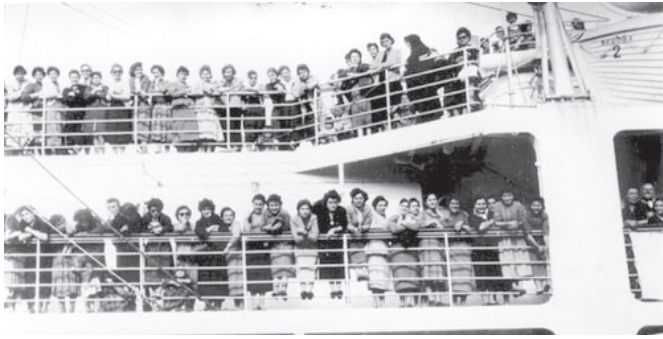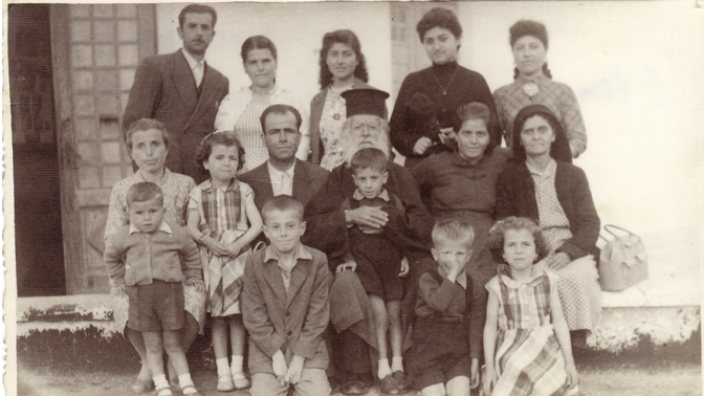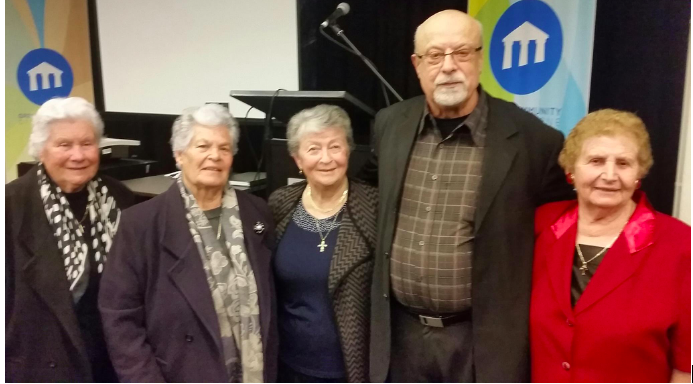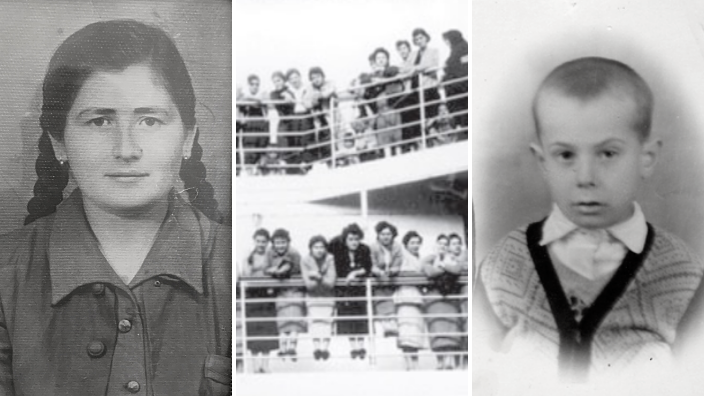It was on the 21st of May, 1957 – The old Spanish ship “Begona” was about to embark on another voyage from the port of Peiraeus, in Athens to Australia. This trip, however, was not like the rest. It was unique and this is how history would record it.
On board the ‘Begoña’ were 900 young Greek brides, immigrating to Australia to marry prospective grooms who they only knew from photographs, a few men and some Greek families, who were travelling in order to reunite with their loved ones, who have already left Greece in search of a better life. All of them with a one way ticket.

Among the passengers, were eight-year-old Panagiotis Photakis and 22-year-old Maria Katsou.
Little Panagiotis, along with his mother and two brothers, left Sianna, a village on the island of Rhodes and went to Piraeus, in Athens, to start the journey that almost a month later would reunite them with the father of the family, who had immigrated to Adelaide, two years earlier.
Maria was travelling alone. She said bye to her parents and siblings and left Dyrrachio, a mountain village of less than a few hundred residents in Southwestern Arcadia, to take care of her older brother who had already emigrated to Australia and was working in Melbourne.
Sixty-three years later, Mr. Photakis – now a retired educator – and Mrs. Katsou, mother and grandmother, call each other “brother and sister” even though they were not in contact for six decades but reunited three years ago.

‘I’ll go now; but come and find me when you are older’
“It was the feast day of Saints Constantine and Helen. At the port of Piraeus, my mother and her brothers came to farewell me. The crew had already taken luggage aboard; I was about to get on to the ship too. Next to the stairs, was a little boy looking at me with his eyes full of tears. He didn’t want to get on board. I asked him what his name is and he didn’t answer. His mother told me his name is Panagiotis,” recalls Mrs. Katsou, 85.
Maria got aboard and from the top deck she could still see the little boy who reminded her of her little brother, whom she left behind.
“Before I left my home in the village, I kissed my little brother who was asleep on his bed next to the fireplace. This is who I saw in Panagioti and I promised to give him all the love I was not able to give my brother,” Mrs. Katsou tells The Greek Herald.
But little Panagiotis was still refusing to get aboard the ‘Begona’ although his mother and his two brothers were walking up the stairs
Maria, felt the need to help.

“I grabbed my backpack, threw it over my shoulder and ran down to the dock. Some crew members saw me and thought I was trying to run away. I could hear them calling my name from the loudspeakers. But I had to pick up the boy. I promised to buy him ice cream, took his hand in mine and got on board again,” says Mrs Katsou.
From then on, young ‘Mia’ as Panagiotis used to call Maria, became the sister he never had. She kept him entertained throughout the month-long journey and never left her side.
“He would eat with his mum and return to the cabin I was sharing with another girl. He was well behaved and only once I had to tell him off but I didn’t tell his mother. We were crossing the Suez Canal and we had been instructed not to extend our hands out of the portholes. Of course, he did the opposite,” Mrs Katsou says.
On June 16 1956, less than a month later, Begona reached Port Melbourne Pier.
“I have to go now but when you grow up come and find me,” Maria told her little friend.

‘Maria was my guardian angel’
Panagiotis Photakis, 71, recently retired after a 50 year long career as an educator. He taught the Greek language to hundreds of Greeks in South Australia and never forgot Maria and his journey with Begona’s Greek brides.
“My family and I travelled together with 900 young girls. One could separate them into three categories. Those who were coming to be wed to grooms who they knew only from photos, the ones who were already engaged and the ones who were immigrating with their families or to visit family in Australia.”
“I remember I didn’t want to leave my village. Although the journey turned out to be enjoyable for me, it was exactly the opposite for some of the brides,” Mr Photakis says, explaining how important Maria’s friendly presence was, during a journey that would have otherwise been difficult.
“Maria was my guardian angel. She looked after me. She became my sister. Together we would go to English lessons on the ship – she never left my side. I lost her when the ship got to Melbourne,” he says.
On that day, at the Port Melbourne Pier, were more than 4.000 young, single men, waiting to meet their prospective wives. Some of them were even climbing on to the balustrades to find the best partners first!
“My father and family were there to pick us up. I remember hundreds of flowers and photos littering the dock. This meant that the photos of the grooms many brides were given in Greece, did not match the men they met upon arrival. At this point, I lost Maria.”

Four decades after he arrived in Australia, Photakis took the initiative to source an original passenger list of the ship and started looking for the brides and record their stories, to shed light on this important part of modern immigration history.
In 2017, he advertised in a Greek newspaper, the invitation for the celebration he organised in South Australia, for the 60 Years from the arrival of the Greek Brides of Begoña.
Maria’s late husband happened to see the advertisement and told her that someone called ‘Panagiotis Photakis’ was the organiser.
“I asked around for his phone number. I found it, called him and I ended up going to Adelaide to see him,” Mrs Katsou said.

Today, Panagioti’s family has one more member. Maria. He calls her “big sister”.
Six decades were not enough to get in the way of their strong friendship, which began on the old Begona.
“Every time I ring her, she lights-up,” says Photakis. Like time has stopped.

